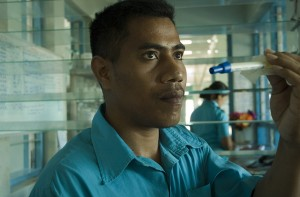2015 aid stakeholder survey
The Australian aid stakeholder survey will be returning in 2015, and will be expanded to include New Zealand. First run in 2013, the survey is a tool designed to obtain feedback on the effectiveness of Australia’s and New Zealand’s aid programs and provide suggestions for their improvement. The survey will be run over three months from mid-2015, with the results to be launched at the end of the year. It will again be broken into two phases: the first phase will be limited to a pre-identified group of respondents and the second phase will be open to the public. Keep an eye on the blog and newsletters in the coming months for more details. And please contribute. We need your views to tell us how the aid program is going.
ACFID partnership
Devpolicy is entering a partnership with ACFID to help the peak body for development NGOs design and analyse its annual member surveys. Given our interest in NGO aid, and our aim to be a resource for the sector, we’re looking forward to this deepening of our collaboration with ACFID.
 The Pacific’s double disease burden
The Pacific’s double disease burden
Kerri Viney told us that, of the ten countries with the highest rates of diabetes, seven are in the Pacific. The Pacific also has relatively high rates of TB, and Kerri’s research in Kiribati shows that there’s a link between the two. For example, TB patients are three times as likely to have diabetes as the general population (even after adjusting for other variables).
Check out Camilla Burkot’s graphs to see just how much the Pacific stands out as a high-TB, high-diabetes region.
In other health posts, Ian Anderson digs into some recent reports on non-communicable diseases (NCDs) to bring us the good news that something can be done about these problems, and cheaply; and Joel Negin calls for an Australian emergency team to be established to respond to infectious disease outbreaks.
Evaluating Australia’s Syria response
DFAT’s Office of Development Effectiveness (ODE) recently evaluated Australia’s response to the Syrian crisis. So how did the evaluation, and the response, stack up? Jo Spratt writes positively about the evaluation, but is less enthused by the management response.
The evaluation of the Syria response, along with an evaluation on the Horn of Africa crisis, will be discussed on 29 April as part of our third annual forum on Australian aid evaluations. The forum will also look at DFAT’s new Performance of Australian Aid 2013-14 report. Speakers include senior aid management and ODE staff, as well as Devpolicy analysts. Register here.
Do SWAps work?
We will be hosting an event on Sector Wide Approaches (SWAps) in health next week with Rohan Sweeney of the Centre for Health Economics at Monash University. Rohan will present his findings on the impact of the implementation of SWAps on infant mortality rates. Register here.
Dates for 2016 Australasian Aid Conference
We are pleased to confirm that the Australasian Aid Conference will be returning on 10-11 February 2016, once again in partnership with The Asia Foundation and hosted at The Australian National University. We will be running a call for papers from June.
Upcoming events
Australian aid evaluations: program performance and humanitarian responses
Wednesday 29 April, 9.30am – 1.30pm. Register here.
Has the Sector Wide Approach delivered improvements in population health?
Thursday 30 April, 12.30pm – 1.30pm. Register here.
2015 aid budget breakfast
Wednesday 13 May, 9am – 10.30am. Register here.
Global inequality: are the world’s poorest being left behind?
Dr Martin Ravallion. Tuesday 9 June, 5.30pm – 6.30pm. Register here.
2015 PNG Update
18-19 June, University of Papua New Guinea. Details here.
Blog highlights
Confirmation that the fall in oil prices will hit the PNG budget
Canada’s new development finance institution
On the blog
Seizing opportunity: the UK and the Asian Infrastructure Investment Bank by Elliott Cappell
New evidence on microfinance by Terence Wood
NCDs: bad news and “best buys” by Ian Anderson
Evaluating Australia’s Syrian response: will DFAT act? By Joanna Spratt
Eliminating project fees in PNG schools: a step too far? By Grant Walton
Rural development in Timor-Leste: some alternatives to decentralisation by Terry Russell
When ancient and modern diseases collide: evidence from Kiribati on the link between diabetes and tuberculosis by Kerri Viney
Pacific spying: allegations and implications by Bal Kama
Are we ready for an Asia-Pacific influenza outbreak? By Joel Negin
Confirmation of PNG’s budgetary challenges: new strategy needed by Paul Flanagan and Stephen Howes
In brief
NGOs gear up campaigns as budget looms
Visualising the TB-diabetes co-epidemic in the Pacific
Canada creates a bilateral Development Finance Institution: will Australia follow suit?
2015 World Development Indicators highlight 25 years of progress
Learning from UN ‘innovation spaces’
UPNG to mark 50th anniversary with higher ed conference
This is the fortnightly newsletter of the Development Policy Centre at Crawford School of Public Policy, The Australian National University, published every second Friday.



Leave a Comment